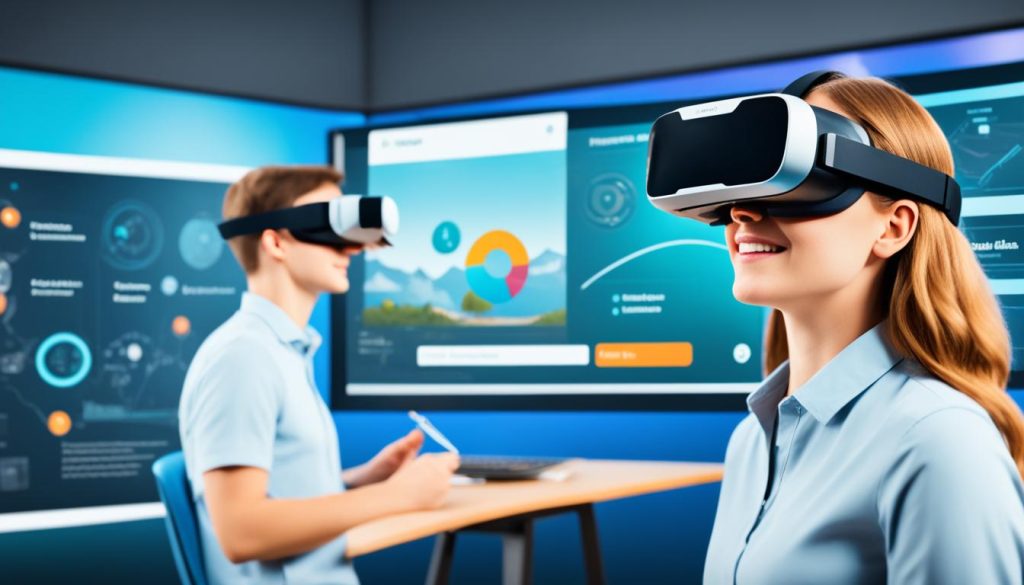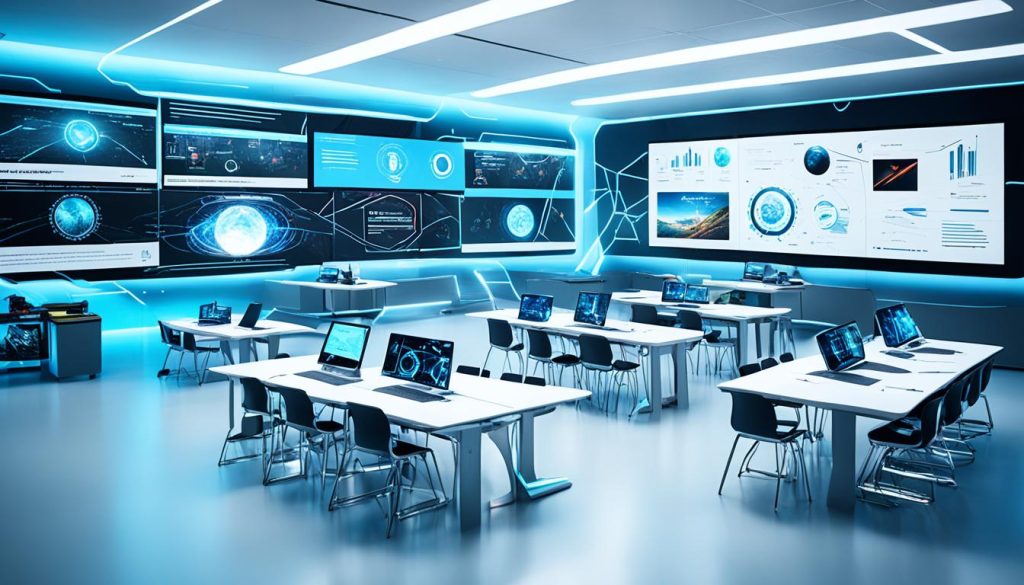The European Commission’s initiative, “eLearning: Designing tomorrow’s education,” focuses on improving the quality of learning through multimedia technologies and the internet. This involves the development of e-learning platforms that enhance access to resources, facilitate remote collaboration, and improve teaching and learning effectiveness through information and communication technologies. The action plan includes infrastructure development, training programs, services, and content creation to promote lifelong learning, employability, and social inclusion.
Key Takeaways:
- E-learning platform development plays a crucial role in advancing education.
- The European Commission’s initiative aims to improve access, collaboration, and teaching effectiveness.
- The action plan includes infrastructure development, training programs, services, and content creation to promote lifelong learning and employability.
Challenges in E-Learning Platform Development
When it comes to creating and designing e-learning platforms, developers face various challenges. These challenges encompass accommodating diverse and complex content, ensuring scalability and multi-tenancy, and complying with regulatory standards to safeguard sensitive data. Let’s explore these challenges in detail.
1. Accommodating Complex Content
To create a robust e-learning platform, developers need to consider accommodating a wide range of multimedia content. This includes audio files, video lectures, PDF documents, and interactive presentations. Additionally, developers must support custom file formats, such as whole slide pathology images, radiology images, and clinical images. By ensuring compatibility with these various file types, the e-learning platform can offer a seamless learning experience for users with different content needs.
2. Ensuring Scalability and Multi-Tenancy
Scalability is a crucial factor to consider when developing an e-learning platform. As the user base grows, the platform must be able to handle an increasing number of users and their concurrent activities. To achieve this, developers need to design the platform using scalable architectures and technologies that can efficiently manage large amounts of data and traffic. Multi-tenancy, on the other hand, allows different organizations or institutions to use the e-learning platform simultaneously, each with their own personalized settings and content. This enables the platform to cater to a diverse range of users and organizations, enhancing its overall usability and value.
3. Compliance with Regulatory Standards
Compliance with regulatory standards is paramount when developing e-learning platforms, especially in sensitive fields like healthcare. For example, the HIPAA (Health Insurance Portability and Accountability Act) and HL7 (Health Level Seven) standards mandate strict privacy and security measures to protect medical data. Developers must ensure that the platform adheres to these standards, implementing robust encryption, access controls, and data protection mechanisms. By prioritizing regulatory compliance, e-learning platforms can foster trust among users and provide a secure environment for learning and collaboration.
| Challenges | Considerations |
|---|---|
| Accommodating Complex Content | Supporting a wide range of multimedia and custom file formats |
| Ensuring Scalability and Multi-Tenancy | Designing scalable architectures to handle increasing user demand and simultaneous usage by different organizations |
| Compliance with Regulatory Standards | Implementing privacy and security measures to meet regulatory requirements, such as HIPAA and HL7 |
Overcoming these challenges in e-learning platform development is essential to create a user-friendly and secure environment for learners. By addressing complex content accommodation, ensuring scalability and multi-tenancy, and complying with regulatory standards, developers can build robust platforms that empower educators and learners alike.
Innovative Solutions in E-Learning Platform Development
When it comes to e-learning platform development, Fission Labs sets itself apart with its cutting-edge solutions. This technology company has successfully developed a comprehensive e-learning platform for a leading healthcare organization, offering a range of advanced features and functionalities to enhance the learning experience. With a focus on clinical case management, remote consultation, education, and research, this platform is a game-changer in the healthcare industry.
One of the standout features of the platform is its incorporation of advanced AI modules. These modules enable intelligent decision-making and personalized learning experiences, allowing users to receive tailored recommendations based on their individual needs and progress. Whether it’s suggesting relevant resources, identifying knowledge gaps, or providing real-time feedback, the AI-powered capabilities significantly enhance the efficacy of learning.
The platform also boasts impressive visualization capabilities, especially when it comes to medical imaging. With zero-footprint pathology and radiology viewers, medical professionals and students can easily access and analyze complex images without the need for specialized software or hardware. This streamlined approach improves efficiency and accessibility, helping users make accurate diagnoses and gain a deeper understanding of medical conditions.
Furthermore, the platform offers interactive collaboration tools, enabling users to engage in virtual discussions, knowledge sharing, and group projects. These tools promote a collaborative learning environment, fostering engagement, teamwork, and peer-to-peer learning. Whether it’s participating in online forums, conducting virtual case studies, or collaborating on research projects, learners can connect and collaborate with fellow professionals from around the world.
To cater to the unique needs of different healthcare organizations, the platform offers customizable medical authoring workflows. This feature allows organizations to create and deliver their own courses, assessments, and educational content. By providing a flexible and customizable platform, Fission Labs empowers institutions to align their e-learning initiatives with their specific educational goals and requirements.
In addition, the platform supports virtual conference capabilities, facilitating remote learning and collaboration. Users can participate in live webinars, conferences, and workshops, gaining insights from industry experts and thought leaders without the need for travel or physical attendance. This virtual conference feature broadens access to professional development opportunities, making it easier for busy healthcare professionals to stay updated with the latest advancements in their fields.
The platform’s robust architecture is built using a service-oriented approach and leverages cloud-based technologies for scalability and cost-effectiveness. This ensures that the platform can handle a growing user base and seamlessly integrate additional features and functionalities as needed. By adopting cloud-based technologies, Fission Labs eliminates the need for extensive in-house infrastructure, allowing healthcare organizations to focus on delivering high-quality education and training.
Benefits of Fission Labs’ E-Learning Platform:
- AI-powered modules for personalized learning
- Zero-footprint pathology and radiology viewers for easy image analysis
- Interactive collaboration tools for virtual discussions and group projects
- Customizable medical authoring workflows for tailored education content
- Virtual conference capabilities for remote learning and professional development
- Scalable and cost-effective architecture leveraging cloud-based technologies
This e-learning platform developed by Fission Labs demonstrates the immense potential of e-learning in transforming healthcare education. By providing innovative solutions, this platform equips healthcare professionals with the tools and resources they need to expand their knowledge, enhance their skills, and improve patient care.

Business Benefits of E-Learning Platform Development
The implementation of e-learning platforms has brought about significant advantages for the healthcare industry. These platforms have provided global reach, connecting healthcare professionals from over 180 countries and granting them access to an extensive repository of medical knowledge and resources. The development of e-learning platforms has facilitated seamless collaboration and streamlined workflows, leading to improved efficiency in both learning experiences and clinical practices.
Moreover, e-learning platform development services have demonstrated remarkable innovation by bridging the gap between technology and healthcare education. These platforms have paved the way for future advancements in healthcare, enabling professionals to stay updated with the latest information and practices.
By leveraging these e-learning platforms, healthcare organizations can transform education in the industry, setting new standards for accessibility, efficiency, and engagement.

Conclusion
The development of e-learning platforms is crucial for advancing education in various fields, including healthcare. These platforms offer innovative solutions to complex challenges and provide numerous benefits to professionals and learners.
By leveraging technology and incorporating features like interactive collaboration and customizable workflows, e-learning platforms contribute to the transformation of education. They provide a flexible and accessible learning environment that caters to the diverse needs of learners and encourages active engagement.
The success of the Fission Labs project exemplifies the potential of e-learning platforms in revolutionizing healthcare education and improving accessibility and efficiency in the industry. Through the implementation of advanced AI modules and interactive tools, the platform enables healthcare professionals to enhance their skills, collaborate with peers, and stay updated with the latest medical advancements.
In conclusion, e-learning platforms have the power to enhance education, empower professionals, and ultimately improve patient outcomes. As technology continues to advance, the potential for further innovation in e-learning is limitless, opening up new possibilities for lifelong learning and continuous professional development.




No comments! Be the first commenter?